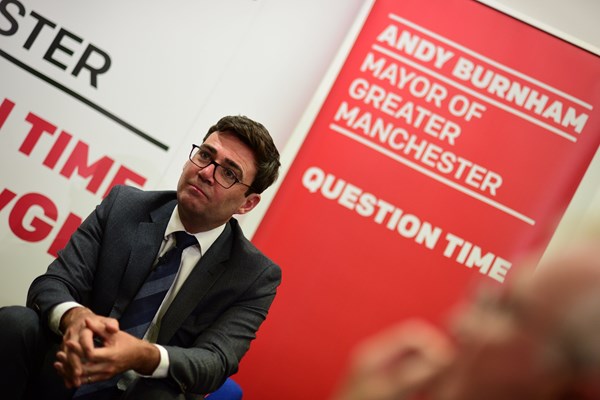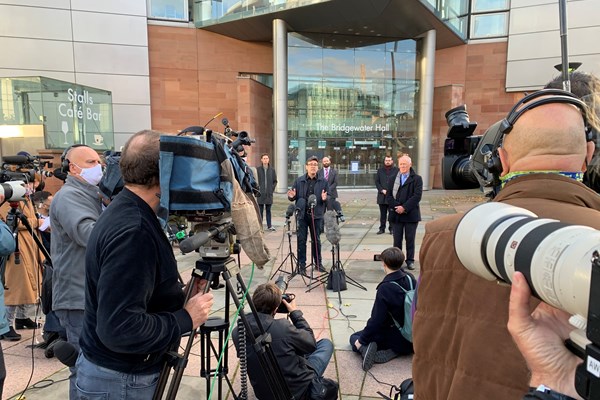
Mayor of Greater Manchester calls for a “standards-led” release from lockdown
- The ability to meet safe working standards should be the guiding principle behind release from lockdown, rather than an arbitrary sectoral approach
- Government support for business should be linked to the introduction of better employment standards, including a real Living Wage
- Andy Burnham warns that a regional approach to release would be impractical, whilst a sector-led release could unfairly hold businesses back
- Government should establish a National Recovery Council made up of voices from the regions, trade unions and business to build consensus around the tough decisions that lie ahead
- A standards-led approach to recovery would be part of a national Build Back Better campaign, which aims to make the COVID crisis a reset moment for the UK economy and society
The Mayor of Greater Manchester has called on the Government to adopt a standards-led approach to reopening businesses after the lockdown, saying that a regional release would be impractical and a sector-led approach could be unfair.
Speaking on Ridge on Sunday, Andy Burnham said that a standards-led approach would put health and safety considerations at the heart of the recovery process but would also give every business a potential route to re-opening. The decision on whether they were able to do so would be based on staff safety and the implementation of clear social distancing and hygiene standards, rather than membership of a particular sector. If businesses were prepared to innovate and change how they work, all would potentially have a route back to trading.
The Mayor said that a standards-led approach could be overseen by the Health and Safety Executive, in partnership with Public Health England, to ensure compliance. This could include risk stratification of different sectors, with self-assessment for low-risk sectors and inspection for those in higher-risk categories.
Greater Manchester is already working on its own version of the scheme and developing a “safe working” kitemark to build consumer and public confidence.
Andy told the programme: “If you take a standards-led approach you’re putting health and safety at the heart of this release from lockdown, and that’s the way to go in my view. It would be overseen by the Health and Safety Executive, but it would allow businesses in all parts of the economy to innovate – perhaps to change the way they work, limit the number of employees that they have in work – but at least it would give them a route back.”
In addition to safety standards, Andy Burnham is also calling on the Government to put good employment standards at the heart of the recovery process.
This week, research from the Institute for Fiscal Studies (opens new page) found that essential key workers, upon whom the country has been depending in recent weeks, are more likely to be in low-paid, insecure employment contracts. Going forward, the Mayor says that all Government financial support should be explicitly linked to the introduction of good employment standards, such as the real Living Wage and a ban on enforced zero-hours contracts.
He offered the Government the opportunity to use Greater Manchester’s Good Employment Charter as the vehicle to improve standards in return for Government funding.
He said: “People are looking at the world with new eyes and can see how unfair it is that the people still out there working, and keeping the country running at risk to their own personal safety, are also the lowest-paid in society. Coming out of this, we need a national revaluation of work. For at least the last 20 years, we have been over-valuing the work of the top 50% in society and under-valuing the bottom 50%. The time has come to narrow the gap between the bottom and top and give those on the minimum wage a decent pay rise.”
The Mayor raised concerns about an approach to release from lockdown based on regions or sectors.
A regional release would be unworkable, he said. If some parts of the country were still in lockdown watching others parts return to school, work and leisure, it would be unfair and impossible to enforce.
A sectoral release could be arbitrary and risk businesses in a released sector returning without the necessary health and safety standards in place. It could hold some businesses back unfairly and potentially harm places reliant on sectors that would be the last to be released.
Speaking on the programme this morning, Andy said: "The impact of a sectoral approach could hit certain places hard, so what I’m saying to the Prime Minister is: think about a standards-led approach, and create a National Recovery Council, because we all need to have a voice in this debate. These decisions that you are about to take are crucial to the economy of the North West of England, and we need to be in the room debating it with you."
Andy Burnham highlighted how this approach to lifting the lockdown would also help the economy to ‘Build Back Better’. Over recent weeks the Mayor has set out his hope that some of the ‘benefits’ of the lockdown such as cleaner air, a greater focus on exercising and more flexible working, should not be lost as soon as the lockdown is lifted.
Together with the Mayor of the Liverpool City Region, Steve Rotheram, Andy Burnham is developing plans for a Build Back Better campaign with businesses and trade unions. He urged the Government to consider making it a national campaign together with the establishment of a National Recovery Council. The Council would build collaborative networks across the country and ensure that the interests of different sectors and regional economies are protected and represented during a national recovery effort.
The Mayor said: "Many of us have been at home while others have been out there running the country, in supermarkets and care homes and other places. They are the lowest paid people in society, and I don’t feel at all comfortable with that.
"Coming from this we should say that ongoing Government support for businesses should be linked to good employment, and very specifically payment of the real living wage.
"I believe that in this country for the last 20 years we’ve been overpaying people at the top of organisations and underpaying people at the bottom. I think we need a real national commitment to build back better, and recognise that those minimum wage heroes who’ve been out there working for us all need a much better deal than the one they’ve had in recent years."
Article Published: 26/04/2020 10:01 AM



